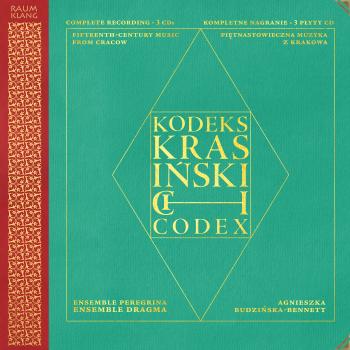The Krasiński Codex: Fifteenth-Century Music from Cracow
View record and artist detailsRecord and Artist Details
Genre:
Vocal
Label: Raumklang
Magazine Review Date: 03/2025
Media Format: CD or Download
Media Runtime: 180
Mastering:
DDD
Catalogue Number: RK4402

Tracks:
| Composition | Artist Credit |
|---|---|
| The Krasiński Codex |
Anonymous, Composer
Agnieszka Budzińska‑Bennett, Conductor Ensemble Dragma Peregrina Ensemble |
Author: Fabrice Fitch
Recording the contents of an entire 15th-century manuscript is a huge undertaking. There have been only two such projects as far as I know: the Consort of Musicke’s Chansonnier Cordiforme (L’Oiseau-Lyre, 11/80) and, in the past decade, the Leuven Chansonnier by Ensemble Sollazzo (Passacaille, 9/24). This new project innovates in several ways; most notably, the Krasiński Codex contains both sacred and secular music and a far broader range of repertory. Copied in the mid-1420s at the Royal Polish court (then based in Kraków), it transmits music by local composers, most notably Nicholas of Radom, alongside works by Ciconia, Zachara da Teramo and Estienne Grossin. This variety reflects the reach of Italian and French music throughout Europe, but the proportion of music that reflects local practice, though typical of manuscripts like this one, often goes unrepresented in discography: that is one reason to welcome this enterprise. Also typical is the sometimes piecemeal transmission of some of the music, which ranges from a tiny Alleluia and untexted pieces (probably songs) to lengthy Mass movements and Magnificat settings. This is not necessarily carelessness but reflects the adaptation of pieces from elsewhere to suit local practice (not least by supplying new words or omitting them altogether). This calls for a greater range of performance situations than the stable repertory of the chansonniers, not to mention a fair amount of intervention by the performers, many of whom are also established scholars. A simple example: the short three-voice Salve thronus Trinitatis is performed first by male singers and later on harp and a gittern. The men bring a solid, tranquil power to this simple polyphony, but the second time around Marc Lewon executes the nattiest diminutions on the top line, whip-sharp and bracingly snappy. Completing this sonic panorama, the penultimate track draws on the tradition of polyphony improvised upon plainchant, and a couple of others sound as though they might.
To dwell on the project piece by piece is unnecessary, but the main points are easily made. First, Lewon, Agnieszka Budzińska-Bennett and Grace Newcombe sing and play several instruments, and they all excel. Newcombe’s voice has many admirers, but she’s also very canny on the organetto (those crunchy leading-notes!) and the harp. The instrumental playing stands out for its fluency and precision and the vocal soloists are generally on great form, whether as an ensemble (in the Gloria Ad ongni vento by Zachara) or singly (the Regina gloriosa attributed to Ciconia, with Lorenza Donadini on the cantus line). A little less distinctive are the Mass movements by Zachara and Ciconia done with several sopranos on the cantus line and voices and trombones on the lower parts, channelling too directly past performances by the Italian ensembles Sine Nomine and La Reverdie. But most importantly, the lion’s share of music that’s recorded here for the first time is superbly done. Mostly known only to specialists of Central European music, Nicholas of Radom gets a proper outing here, his unfussy, stylish music beautifully showcased.
The manuscript’s contents are parsed into three CD-length programmes, each of which can be heard on its own since their themes overlap almost entirely. They are a handy way into a project that succeeds in being more than the sum of its parts: we glimpse the variegated polyphonic soundscape of a major 15th-century court at its cultural and historical peak. It’s early in the year, but this will surely be a contender for my Critics’ Choice in December.
Discover the world's largest classical music catalogue with Presto Music.

Gramophone Digital Club
- Digital Edition
- Digital Archive
- Reviews Database
- Full website access
From £8.75 / month
Subscribe
Gramophone Full Club
- Print Edition
- Digital Edition
- Digital Archive
- Reviews Database
- Full website access
From £11.00 / month
Subscribe
If you are a library, university or other organisation that would be interested in an institutional subscription to Gramophone please click here for further information.




